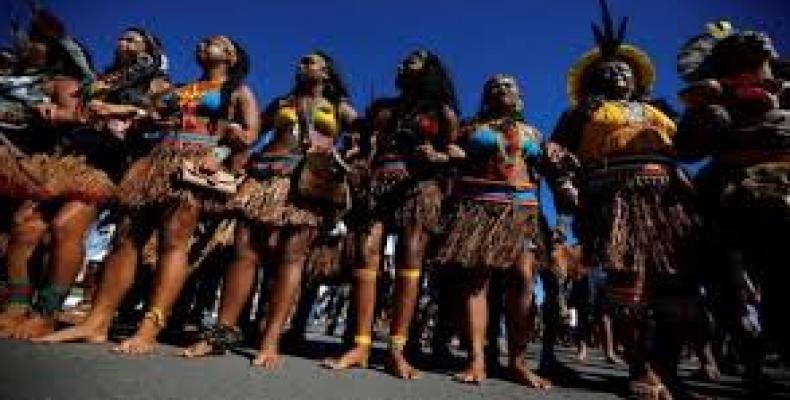Brasilia, April 27 (RHC)-- Thousands of Indigenous people marched during this year’s Free Land Encampment event on Friday, spending the first of the three-day demonstration outside Brazil’s congressional building.
Over 1,000 demonstrators erected tents on the front lawn of the Brazil’s congress in a peaceful protest against President Jair Bolsonaro’s vow to expand mining and industrial farming into protected Indigenous territories.
"What is being disputed is the land," former vice presidential candidate and Indigenous leader, Sonia Guajajara, told the Associated Press. She said that the Brazilian president “wants to give the indigenous territories to the United States, to foreigners, to explore our natural resources. We fight not only for our rights, our constitutional rights, but for our right to exist."
Cleber Cesar Buzatto, secretary general to the Indigenous Missionary Council, explained: “Where indigenous lands are demarcated, registered and controlled by the peoples, these territories are preserved and cared for." Buzatto added: "In some regions, in some states like Rondonia, Mato Grosso, Maranhao, these lands are like true oases in the middle of farming commodities fields, and of a lot of environmental destruction-"
The Brazilian Indigenous movement has been under attack since January when Bolsonaro took office. On his first day as president, Bolsonaro signed a decree transferring power over Indigenous lands from the National Indian Foundation (Funai) to the Agriculture Ministry.
Dinaman Tuxa, coordinator for the Articulation of the Indigenous People of Brazil (APIB), warned “There will be an increase in deforestation and violence against indigenous people.”
However, new decisions against Indigenous land and cultural rights are becoming more frequent. On April 11, former army captain Bolsonaro announced the extinction of "social councils," which were public institutions aimed at increasing people's involvement in social and health-related policies.
All these anti-Indigenous policies are happening at a time when Bolsonaro faces strong disapproval ratings across the country. At the end of March, the far-right leader was only supported by 34 percent of the population, according to the Brazilian Institute of Public Opinion and Statistics.


